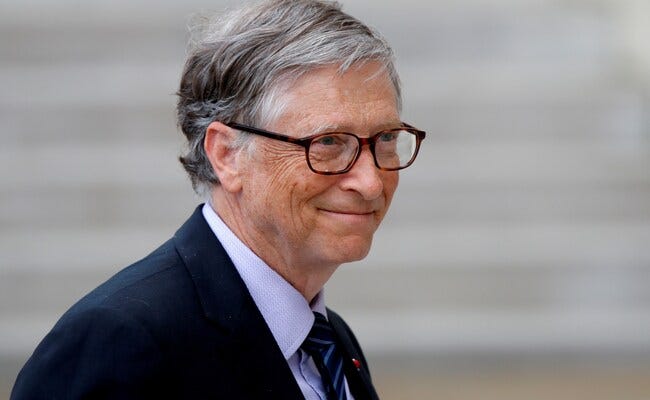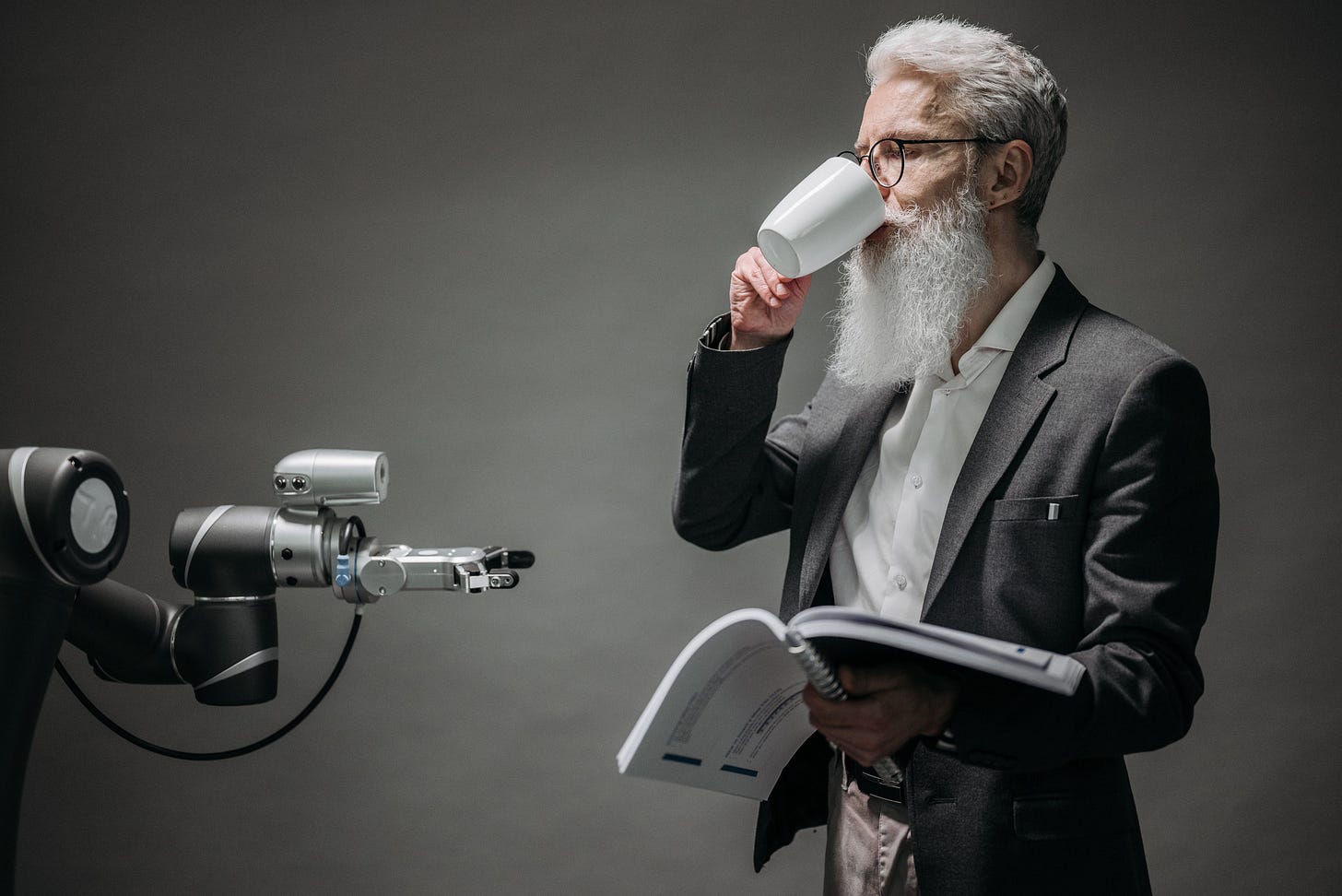The AIgenda Edition 1.
Thank you for subscribing!
Firstly I’d like to introduce myself, my name is Oliver Yeowart and I am a passionate technologist, always wanting to learn more about the future of technology. I’d also like to thank you for subscribing to my first edition of the AIgenda and I can’t wait to post articles for you weekly (hopefully). My newsletter is targeted to everyone and is there to soothe any nerves you have about AI taking over the world, and inform other passionate technologists like myself about current tech affairs. You can send it to your Grandma if she’s worrying her Alexa might go rogue with murderous intent, or your friend who is almost too interested in robot companionship. Either way if you’re here to learn, I’m here to inform. Happy reading!
1. Bill Gates: Robot Assistants to Become Household Norm in 5 Years, Says Microsoft CEO
Bill Gates predicts that the world would "change completely" in the next five years.
Bill Gates predicts that in the next five years, everyone will have a personal assistant powered by artificial intelligence (AI) that can do almost anything. These AI agents will be proactive and capable of making suggestions before you even ask for them. They will be able to arrange trips, recommend activities based on your interests, and book reservations at restaurants you would enjoy. AI tools will also be able to help with business tasks, such as writing business plans, creating presentations, and generating product images, despite the software being “pretty dumb” right now. Companies will be able to make these agents available for their employees to consult directly and be part of every meeting. While there will be competition in the AI agent market, Gates believes that agents will become very inexpensive due to the increasing number of companies working on AI. Eventually, these agents will operate on their own and be able to assist individuals in the same way that personal assistants support executives today.
With Gates predicting an AI assistant in “every household”, this could affect everyone in the world, or at least everyone with the means to buy an AI assistant. This may seem relatively dystopian, however, it could be a force for good and improve everybody’s organisational skills.
2. Lyria: DeepMind and YouTube Redefine Music Creation with AI
Google has recently unveiled Lyria, an AI music generation model developed by Google DeepMind. This innovative model has the capability to generate vocals, lyrics, and background tracks that closely resemble the style of well-known artists.
Google DeepMind unveils Lyria, a ground-breaking music generation model that integrates seamlessly with YouTube. Powered by advanced AI algorithms, Lyria creates captivating tunes based on word prompts, revolutionising the music creation process. Accompanied by experimental toolsets Dream Track and Music AI, Lyria empowers artists to tailor music for YouTube Shorts and transform hummed melodies into fully-fledged compositions effortlessly. Maintaining musical continuity with its powerful algorithms, Lyria bridges the gap between human creativity and AI innovation. This game-changing technology, developed with input from renowned artists like Charlie Puth, is reshaping the music industry, expanding creative possibilities and pushing the boundaries of musical expression. Welcome to the future of music with Lyria.
Unless you’re seriously into music, and think you’d like to use AI in this field, Lyria isn’t particularly relevant for you.
3. Will AI Take Over the World? How Dominant Will Humans be in Light of New Technology?
Is your future a dystopia with robot wars? Or is it a utopia with humans harnessing the power of multiple worlds, with man, machine, flora and fauna living in harmony? Research suggests neither. Yet.
The future of technology and the progression of things as trivial as a “smart toaster” can cause some serious concern to how humans, as a species, will either ruin ourselves, or create a beautiful earth with no global warming, no wars, no hunger or lawbreakers. While a lot of people would argue we’re headed in either direction, I don’t think we’re quite as predictable as the common sci-fi movie suggests. There are obviously ways we could progress positively, however human nature leads us to believe we’ll make mistakes.
Should You Be Worried?
The basic gist to grasp for now, is that we’re currently completely in control of our technology. Even the brightest artificial intelligence can’t currently think for itself, meaning that AI is purely at our servitude. The only issue with this, is with AI being a current epidemic within schools and workplaces, it’s newfound popularity can lead the power of AI to be placed in the wrong hands. OpenAI struggled with this for a little while with ChatGPT as people could search up “how to create a bomb from household items” or “what’s the recipe for meth in Breaking Bad?”. With filtering problems such as these, if not fixed so quickly, could’ve lead to heinous crimes with your average Joe causing havoc with a homemade bomb.
Can AI Think for Itself?
The premise of “sentience” means that something can have feeling and emotions; essentially thinking for itself. The common thought is that if a sentient AI was able to access the vast wealth of the internet, it could pick up prejudiced ideologies, causing it to hate the human race. As long as we are able to filter what an AI can read and interpret, we should be able to team up (in a sense) with it as a force for good, that can calculate problems that humans can’t fathom, for problems we don’t have the brain capacity for. Doing this, however, would make our species inferior for the first time in centuries, which many world leaders would disagree with.
Is AI Already Being Used as a Force for Good?
As AI isn’t as sinister as movies have led you to believe, it has fallen into the right hands and is now regularly being used for great causes such as combatting world hunger:
AI is emerging as a vital tool in the global effort to combat world hunger. With its ability to analyse vast amounts of data, AI offers solutions to various challenges in agriculture. One area where AI proves particularly useful is in optimising agricultural practices. By analysing millions of data points, AI can determine the most suitable crops, develop better seeds, and maximise current crop output. Moreover, AI enables precise control of herbicide application, minimising environmental impact. Among the notable applications is the Nutrition Early Warning System (NEWS), which utilizes machine learning and big data to identify regions at high risk of food shortages caused by crop failure, rising food prices, and drought. This early warning system empowers authorities to take proactive measures and prevent food crises. As AI continues to advance, it holds immense potential to revolutionise agriculture, from automated farming techniques to smart irrigation systems, ultimately paving the way for sustainable food production and a hunger-free world.
This is just one of the many uses of AI for good, and many new developments are being made constantly to help the progress of the world. If you want to learn more, I’d suggest for you to read 9 more good uses of AI on this Forbes article, which I took inspiration from for this specific section
Whether you like it or not, artificial is going to stick around for good. For better or for worse, humans have to adapt to the way it will change our lives. By sheer human nature, it could be positive in the right hands, and negative in the wrong ones.









